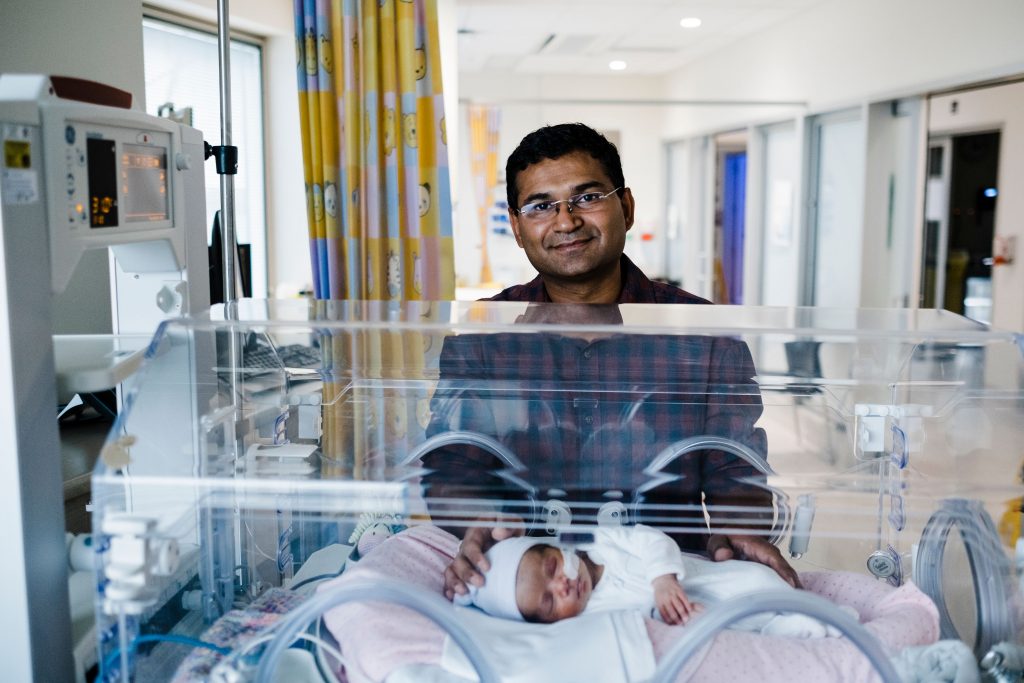“Some people want to be surgeons and hold a knife. I wanted to hold the babies,” Dr Shail Mehta says with a quiet chuckle.
Shail realised where his future lay when he was little more than a baby himself in Northern India. “I always wanted to be a doctor,” Shail says. “And a kids doctor to be very precise.”
His rationale remains beautifully straightforward. “I just thought that when you look after those little kids, the kind of satisfaction you get, because they’re still at the beginning of their life … so it’s up to us how we make the babies into healthy children and healthy adults.”
After stints at Sydney Children’s Hospital, Monash Children’s Hospital in Victoria and BC Children’s Hospital in Vancouver, Canada, Shail joined Fiona Stanley Hospital in 2014.
Shail jokes that when he joined FSH, the hospital was a newborn. “It was a neonatal at the time! And we have now become a toddler. What really makes our days beautiful is the smiles that we see on peoples’ faces, be it the staff, the parents, and that’s what it’s all about. At the end of the day we’re here for the parents.”
The good doctor’s passion extends well beyond the ward. He is a clinical academic, boasting honorary affiliations with Telethon Kids Institute and the University of Notre Dame. His PhD from the University of NSW prompted a reimagining of the way premature babies with brain injuries are treated in the Intensive Care Unit.
And keeping at the cutting edge of research remains a key part of Shail’s working life. “Whatever we’re doing now is based on research and new evidence keeps emerging,” he says. “And I think it’s very important that whatever we do for the patients is evidence based and that’s what drives me. We need to focus our clinical care based on the current international evidence.”
While much of Shail’s work involves caring for babies born prematurely, he is also finding ways to show that early intervention in particular high-risk cohorts will improve long-term health outcomes.
“What we are working on is primarily how we can prevent some of the childhood problems by modifying the early environment of the babies.”
While genetics determines some chronic disease, external factors can also seal a child’s health fate. “One core focus of our research here at Fiona Stanley is the environment starting from in utero life to the first few days of life, which probably is the most crucial period that programs the baby’s health for the rest of their life. And I think it’s very important to understand the intricacies of that and how we can modify that.”
Shail is also looking at how being born to a mum with gestational diabetes and a high BMI can set a child up for future health woes: inflammation can alter the immune and gut microbiome settings and “program your body and immune system to be prone to getting long term complications.”
So one study will look at restoring a baby’s gut microbiome, especially after having been exposed to antibiotics very early in life.
“Gut microbiome, when it’s altered, can shift your trajectory towards having obesity and heart problems and Type II Diabetes in later life.
“The antecedents of obesity are usually written in the first year of life. We need to tackle the problems at the beginning.”
Another study on the horizon will focus on preventing early childhood obesity — kids in Kwinana are among the heaviest in the State. “We have done a study on our kids who come to the paediatric clinics and a quarter of them are obese under the age of five. That is alarming. And we certainly think that things need to be done in the early stages.”
As part of the Healthy Start study, couplets of mothers and babies from the vulnerable high BMI group are supported with lifestyle advice. “Simple things” like breastfeeding are also promoted. “It’s one of the most beneficial factors in the first year of life for babies to prevent all these long term problems in terms of allergies, obesity. And high BMI mothers are known to be the group where the breastfeeding rates are the shortest.”
The father of three insists that preventive research in targeted areas can dramatically improve the lives of today’s children, tomorrow.
“I am very passionate about preventive research because I think once we start focusing on those thing we will be able to reduce a lot of problems that we see in later life. And that will indirectly then alleviate the pressure on the health system that we always worry about.
“Quite often we do want to have quick fixes … We need to start realising that our focus needs to be in simple life interventions, modifications, to the most vulnerable groups. And we don’t necessarily need to wait for the magic pill.”
Donate today to support research




